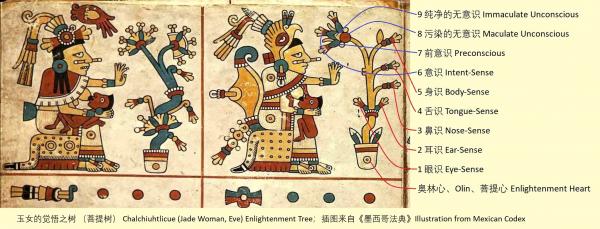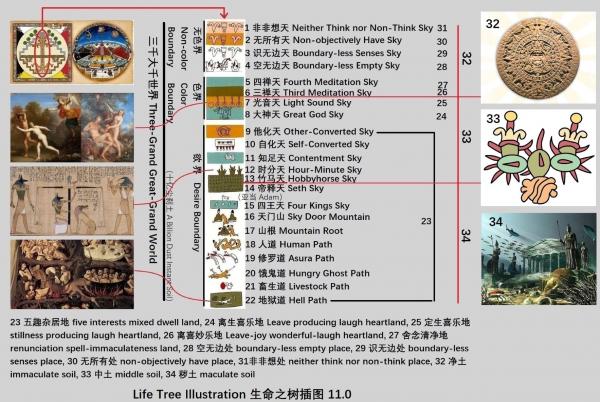识,义为了别,共有八位:1眼识、2耳识、3鼻识、4舌识、5身识、6意识、7前意识、8无意识。其中,第七识前意识,亦作意处,是前六识的移动工作平台;第八识无意识是前七识的总根,亦作本识。如插图11.4.5-1所示,前六识都积累了一体行为习气;识蕴就是此六识行为习气体的总和。 Sense means “clearly distinguishing”; has eight faculties: 1 eye-sense, 2 ear-sense, 3 nose-sense, 4 tongue-sense, 5 body-sense, 6 intent-sense, 7 preconscious, and 8 unconscious. Seventh sense preconscious, is also as Intent-place, is front six senses’ mobile working platform. Eighth sense unconscious is general root of all front seven senses. As illustration 11.4.5-1 shows, earlier six senses, each accumulates a node of habits; Sense Node is sum of those six nodes of habits. 
识就是思想意识,就是心;更具体地说,识有三义:了别名识;思量名意;集起名心。
Sense is meaning, is heart; more specifically, sense has the three significances: 1) “clearly distinguishing” is named as Sense, 2) “meaning and measuring” is named as Intent, 3) “aggregate arousal” is named as heart. 什么是“集起”?答:集起有三义,即能集,所集,集起。能集,是说心能收集、储藏诸法的种子。所集,义为心即是那些收集来的诸法的种子。集起,是说心能将成熟的种子发起,现行,使其成为现时身口意的行为;更具体的解释参见本书的14.1节《集起》。 What is the “aggregate arousal”? Answer: it has three significances: 1) heart is capable to aggregate juristic seeds, 2) heart is those juristic seeds aggregated, 3) heart can arouse mature seeds into performance, let them become present bodily orally or mentally behaviors; more specific explanation refers to section 14.1 Aggregate Arousal. 11.4.5-1 前六识 Front Six Senses 了别就是明了地辨别。(1)眼识,即见色之 见。(2)耳识, 即闻声之闻。(3)鼻识, 即嗅香之嗅。(4)舌识, 即尝味之尝。(5)身识,即感触之感。(6)意识, 即知法之知。此六识,即见、闻、嗅、尝、感、知之义,还有六情之名。 The earlier six senses’ functions are clearly discernment. (1) Eye sense, that is, the seeing of seeing colors. (2) Ear sense, that is, the hearing of hearing sounds. (3) Nose sense, that is, the smell of smelling fragrance. (4) Tongue sense, that is, the tasting of tasting of tasting tastes. (5) Body sense, that is, the feeling of the flesh body. (6) Intent-sense, that is, the knowing of comprehension on laws. The six senses are exactly seeing, hearing, smelling, tasting, feeling, and knowing; and they also have name of “six feelings”. 11.4.5.1-1 与心所有法的相应 Correlation to Heartland Laws 前五识(眼识、耳识、鼻识、舌识、身识)与34位心所有法相应:遍行5(触、作意、受、想、思);别境5(欲、胜解、念、定、慧);善11(信、精进、惭、愧、无贪、无嗔、无痴、轻安、不放逸、行舍、不害);根本烦恼3(贪、嗔、痴);中随烦恼2(无惭、无愧),大随烦恼8(不信、懈怠、放逸、昏沉、掉举、失念、不正知、散乱)。 The former five senses (eye-sense, ear-sense, nose-sense, tongue-sense, and body-sense) match with 34 heartland laws. 5 omnipresent heartland laws (touch, attention, acceptation, think, and mean); 5 circumstantial heartland laws (desire, resolution, spell, stillness, and gnosis); 11 benevolent heartland laws (faith, shame, sin [remorse], non-greed, non-irritation, ignorance-less, diligently advance, ease, non-indulgence, renunciation, harmlessness); 3 fundamental annoyances (greed, irritation, and ignorance); 2 medium latent annoyances (shameless and sinless); 8 large latent annoyances (depression, drowsiness, non-belief, slack, indulgence, lost spell, agitation, and improper know). 第六识(意识)与51位心所有法(参见行蕴)都相应。 Sixth sense, Intent-sense matches all 51 heartland laws (refers to migration node). 11.4.5.1-2 与环境的相应 Correlation to Environments 八识所缘境有三种:性境、独影境、带质境。 Environments aggregated by eight senses can be categorized into the three types: 1) nature environment, 2) solitary-head environment, 3) environment with quality. 一 性境,即有自身性质的境,从实种生,有实体用。能缘之心,得彼自性显相,名为性境,具足五义:一、从现量所得;二、有仗质,比如声音必须有耳听闻的质;三、从自种生,不是从能见种直接生出来的;四、有实际的功能和用途;五、其性质与界系不随能缘心的改变而改变。 Nature environment, that is, an environment with its own nature, which is born from a real seed and has a physical use. Manifestation shown by aggregately heart obtained counterpart nature is named as Nature Environment, has five aspects of significance: 1) gained from present-quantity; 2) have supportive medium, such as sounds must have hearable medium; 3) born from its own seed, not from the aggregately heart born directly; 4) it has practical functions and uses; 5) its nature and boundary system do not change with the change of the capable heart (i.e., mind). 二 独影境,即能缘心单独成相,心自己成相,没有别的本质。独影境的存在依于内滤所托。本书12《禅》中讲的都是独影境。 Solitary-head environment is projected by its own heart alone, without other stimuli or nature, such as hallucination, dream, and occasionally popping out thoughts in loose mind. The environments’ formations are correspondingly following thinker’s opinions, and its existence rely on thinker’s inner thoughts. The book’s chapter 12 Meditation inclusively talks solitary-head environment. 三 带质境,谓能缘心缘所缘境,有所杖质而不得自相,谓之带质境。一、真带质,以心缘心名真带质,即第六识通缘一切心及心所,及第七识单缘第八识之见分是也。二、似带质,以心缘色名似带质,谓带彼相起,有似彼质,如依经作观,非是五识所缘现境故也。 Environment with quality, the objective environment is with medium quality, isn’t its own phenomena; has two types: (1) really with quality, (2) similarly with quality. (1) really with quality, from heart to aggregate heart, is named as “really with quality”. That is, sixth sense aggregates all other hearts or heartland laws; and seventh sense (i.e., preconscious) aggregates eighth sense’s second quadrant (view quadrant). (2) similarly with quality. From heart to aggregate color, is named as “similarly with quality”; the saying is that the environment is aroused with objective, has similar quality of that objective, such as according to sutra to make view, those aren’t front five senses’ objective environments. 至于前六识所对是哪一种境,前五识为缘性境;第六意识通缘这三种境。 In respect of front six senses’ correlation to the three types of environments, front five senses’ counterparts all are first type: nature environments. Sixth sense can aggregate all the three types of environments. 11.4.5.1-3 与三量的相应 Correlation to Three Quantities 八种识所发所得的量有三种:现量、比量、非量。 There are three kinds of quantities produced or received by the eight senses; the three are: present-quantity, metaphysical-quantity, and non-quantity. 一 现量,能缘之心量所缘之境,没有分别计度的情况下所获之量果。现量具有三个条件:一、是现在时,以简别於过去或未来;二、心识认识的对象必须要显现出来,亦即必须是现行位之法,种子不能成为现量;三、现有,在能所位上,即能量之心与所量之境,二者俱是明白现前,和合俱有。 Present-Quantity, during aggregative heart is measuring objective environment, the resulted fruit before any discrimination and measurement is present-quantity. Necessarily, Present Quantity should satisfy the three conditions: (1) it is present, neither past nor future; (2) the being cognized component must be on manifestation; (3) on presentation aspect, the aggregative heart and the being measured environment, both should be on lucidly manifestation, are dependent mutually. 二 比量,是通过推测比度而获致的量果。如见山上有烟,推知该处必有火;见墙外有双角,推知墙外有牛。 Metaphysical-Quantity is speculating measuring fruit from reference, such as you see smoke on the mountain, you can infer that there must be fire there; you see two horns outside the wall, you can infer that there are some cattle outside the wall. 三 非量,似现量和似比量统称为非量。似现量是和现量相似的量,但不是那种现量的事实。似现量,谓有分别智,于境异化而取量。如有智者知道花瓶衣服等,因为对待和分别而生,由彼于义,不以自相为境界故。似比量是不太恰当的比喻量。似比量,依似因智为先,所起相似之义,如于山中误认为雾是烟而推度,那里有火。再比如,看见一个栩栩如生的石头狮子,心生恐惧,不认为它只是一块石头。不能正解,是真之流而非真,名似比量。 Non-Quantity is collectively referred to “similar present-quantity” and “similar metaphysical- quantity”. A “similar present- quantity” is a quantity that is like a real quantity but is not a fact of that kind. Similar Present Quantity, that is, discriminating intelligence differentially fetches quantity, such as, a wise man who knows that vases and clothes are born because of treatment and distinction, those are not by self-phenomena as its realm. A Similar Metaphysical-Quantity is from an inappropriate metaphor. Similar Metaphysical-Quantity, according to preconceptual intelligence wisdom first, the meaning of similarity arises, such as mistaking the fog in the mountains for smoke and inferring that there is fire there. For another example, when seeing a lifelike stone lion, one feels fear and does not think it is just a stone. It isn’t correct, is from factual stream but not real, is named as Similar Metaphysical-Quantity. 前五识唯是现量;第六识中三种量都有。 In respect of former six senses’ correlation to the three Quantities, front five senses (i.e., eye-sense, ear-sense, nose-sense, tongue-sense, and body-sense) only match to the Present-Quantity. Sixth sense, Intent-sense, can process all the three types of quantities. 11.4.5.1-4 八识与道德的相应 Correlation to ethics 道德性可被简化为三种:善性、恶性、无记性。 Ethical natures can be categorized as the three: good nature, evil nature, memoryless nature. 
一 善,能为此世及它世受益的行为。眼耳等前六识有善性。
Good, an action that benefits this world and others. Former six sense (i.e., eye-sense, ear-sense, nose-sense, tongue-sense, body-sense, and intent-sense) all have good nature. 二 恶,能为此世及它世造成损害的行为。眼耳等前六识有恶性。 Evil, an action that can cause harm in this world and in other worlds. All former six senses have evil nature. 三 无记,道德上中性,不善不恶的行为会留下无记业,即无记忆的业或称净业。无记有两种:有覆无记,无覆无记。 Memoryless nature, morally neutral, neither good nor evil behavior will leave no record karma, what memoryless nature is! Memoryless karma is also being called immaculate karma. What is karma? Answer: karma is the three karmas: bodily karma, oral karma, and intentional karma. Bodily karma is bodily behaviors’ habitual deposits, what the flesh body is. Oral karma is lingual habitual deposits, what the mouth’s speaking is. Intentional karma is habitual deposits of intents, what the mental thinks are. Memoryless nature has two types: (1) convertible memoryless, (2) nonconvertible memoryless. 一) 有覆无记,这是在说第七识,前意识,其行为是染污但不产生善恶业,此称无记。前意识的记忆像似计算机的内存,随时更新变化,此说前意识的有覆性。 Convertible memoryless, that is saying of seventh sense (i.e., intent, preconscious), its behaviors are pollutions, don’t produce good or evil karma, that is called “no record” (memoryless). Preconscious memory is like the memory of a computer, it is updated and changed at any time, which means that preconscious is convertible. 二)无覆无记,这是在说第八识。许多无意识的性质终生不变,且其不辨善恶,本性非染,亦非善恶,故名无记,即无记忆。无覆,是说一个人从出生到死亡,一切都会被无意识记忆,无论这个人的思想意识记得还是不记得,它过去的经历记忆都会发生作用。 Nonconvertible memoryless, is saying of eighth sense (unconscious). Many unconscious properties remain unchanged throughout life, and it does not distinguish between good and evil, its nature is not contaminated, nor good or evil, so it is called memoryless, that is, without recallable memory. Nonconvertible means that everything from birth to death of a person will be remembered unconsciously, regardless of whether the person's consciousness remembers it or not, its past experiences all have effects on present and future life. 八识当中,第八识是无覆无记性;第七识是有覆无记性。眼耳等前六识这三种性质都有,于善法中,它们表现为善性;于恶法,它们就是恶性。 Among eight senses, eighth sense (unconscious, also God-sense) is nonconvertible memoryless, seventh sense (preconscious, also Eve-sense) is convertible memoryless. Eye-sense, ear-sense etc. six former senses have all the three ethical natures; that is saying, among good laws, they appear as good nature; in evil laws, they show as evil qualities. 
11.4.5.1-5 八识与三界九地的相应 Correlation to Three Boundaries Nine Heartlands
三界九地参见插图11.0或本书的第13章苦谛。 一 鼻舌(和男女的性感觉)二识只在欲界有,不通上界。二 眼、耳、身三识,唯在 “五趣杂居地” 和 “离生喜乐地” ,此两地存在。第三地及以上,前五识(眼耳鼻舌身)全无。三 第六识意识,第七识前意识,和第八识无意识遍三界九地而有。 Nose-sense, (sexual sense), and tongue-sense exist in desire boundary only. Three boundaries nine heartlands refer to illustration 11.0 or chapter 13. Eye-sense, ear-sense, and body-sense exist in “five interests mixed dwell heartland” and “leave producing laugh heartland”, the two lands. Sixth sense (intent-sense), seventh sense (i.e., preconscious), and eighth sense (i.e., unconscious) exist in all the three boundaries nine heartlands. 11.4.5-2 前意识 Preconscious 前意识,佛教作末那识,神教作夏娃识,古人说其自身细微难辨,故用常随之而起的“意”来指代前意识。意是思量、意图、打算义;是第六识意识的根。前意识是思想意识的工作平台,随着意图的变化不断地自我更新着。 Preconscious is called Mana in Buddhism, and Eve in Islam and Christianity. Ancients said that it is subtle and difficult to distinguish, so they use its major companion "Intent" to represent it. Therefore, we call Preconscious as Intent in Buddhism. Preconscious is root for six former senses, is ever updating work platform of mind, which is constantly updating itself with the change of intention. 
古人常用 “步屈虫(尺蠖)” 来比喻前意识的行为特点。步屈虫移动时,后脚总是抓着些什么;前脚在寻找落脚点,思忖着。前脚抓稳后,后脚跟进。这样它的移动像是在丈量。前意识的特点与步屈虫非常类似,也总是思量着。移动时,前意识也总是执着些什么东西;此执着就是人思想内的很微小的“自我”。这个“小我” ,汉语作福,佛教作儒童,印度教作婆罗门(Bramin),伊斯兰教和基督教作亚伯(Abel)。
Ancients often used "measuring worm (inchworm)" to describe its behaviors. When inchworm moves, its hind feet are always grabbing something; its front feet are looking for a foothold, meaning. After the front foot is firmly grasped, the back foot follows. The way its moves as if measuring. Preconscious’ moves are very similar to those, and it means always. Preconscious is also always attached to something when moving; this attachment is the very tiny "inner ego" of human. The "small self" is called Fortune (福) in Chinese, “genius kid” in Buddhism, Brahmin in Hinduism, Abel in Islam, and Christianity. 另外,前意识对语言的形成有促进作用,所以古人也称之为 “增语触”,义为对语言有增上的作用。 In addition, preconsciousness can promote the formation of language, so ancients also called it "escalatory feeler", which means that it escalates language. 1) 与心所有法的相应 correlation to heartland laws 前意识与18位心所有法相应:根本烦恼4(贪、痴、我见、慢);遍行5(触、作意、受、想、思);别境1(慧);大随烦恼8(不信、懈怠、放逸、惛沉、掉举、失念、不正知、散乱)。 Preconscious match with 18 heartland laws: 5 omnipresent heartland laws (touch, attention, acceptation, think, and mean), 1 circumstantial law (gnosis), 4 fundamental annoyances (greed, ignorance, arrogance, translocating body views), and 8 large latent annoyances (depression, drowsiness, non-belief, slack, indulgence, lost spell, agitation, and improper know). 2) 与环境的相应 Correlation to Three Environments 前意识的所缘境界全是带质境。 All environments aggregated by preconscious are “environment with quality” (refer to section 11.4.5.1-2). 3) 与三量的相应 Correlation to Three Quantities 前意识仅与非量相关联。 Preconscious correlates to non-Quantity (refers to section11.4.5.1-3) only. 4) 与道德的相应 Correlation to Three Ethics 前意识的道德性是 “有覆无记性”。 Preconscious’ ethical nature is “convertible memoryless” (refers to section 11.4.5.1-4). 5) 与九地的相应 Correlation to Nine Heartlands 前意识普遍存在于三界九地,当然四禅天的无想天除外。 Preconscious exists in all three boundaries nine heartlands (refers to section 11.4.5.1-5), certainly excludes “non-think sky” in fourth meditation skies. 11.4.5-3 无意识 Unconscious 无意识最大的特点是异熟。异熟是说无意识中的种子受熏变异而成熟。变异即是成熟,能持业故。又,第16章道谛中述说了无意识的另外十种特性,即十真如。 The most outstanding character of unconscious is mutation. Mutation is saying that juristic seeds in unconscious are being smoked into maturity. Mutation is mature because mutations can keep karmas. And chapter 16 of the book talks about ten kinds of true suchness, which are other ten characters of unconscious. 1) 与心所有法的相应 Correlation to Heartland Laws 无意识只与5位遍行心所有法(触、作意、受、想、思)相应。 Unconscious only matches with 5 omnipresent heartland laws (touch, attention, acceptation, think, and mean). 2) 与环境的相应 Correlation to Environments 无意识的所缘境界全是性境。 Whatever environments aggregated by unconscious are “nature environments” (refer to section 11.4.5.1-2). 3) 与三量的相应 Correlation to Three Quantities 无意识只处理现量。 Unconscious processes present-Quantity (refers to section11.4.5.1-3) only. 4) 与道德的相应 Correlation to Ethics 无意识的道德性是 “无覆无记”。 Unconscious’ ethical nature is “nonconvertible memoryless” (refers to section 11.4.5.1-4). 5) 与九地的相应 Correlation to Nine Heartlands 无意识普遍存在于三界九地。 Unconscious exists in all three boundaries nine heartlands (refers to section 11.4.5.1-5). ↪️返回第11章🎄生命之树的目录↪️Back to Catalog of Chapter 11🎄Tree of Life
| 